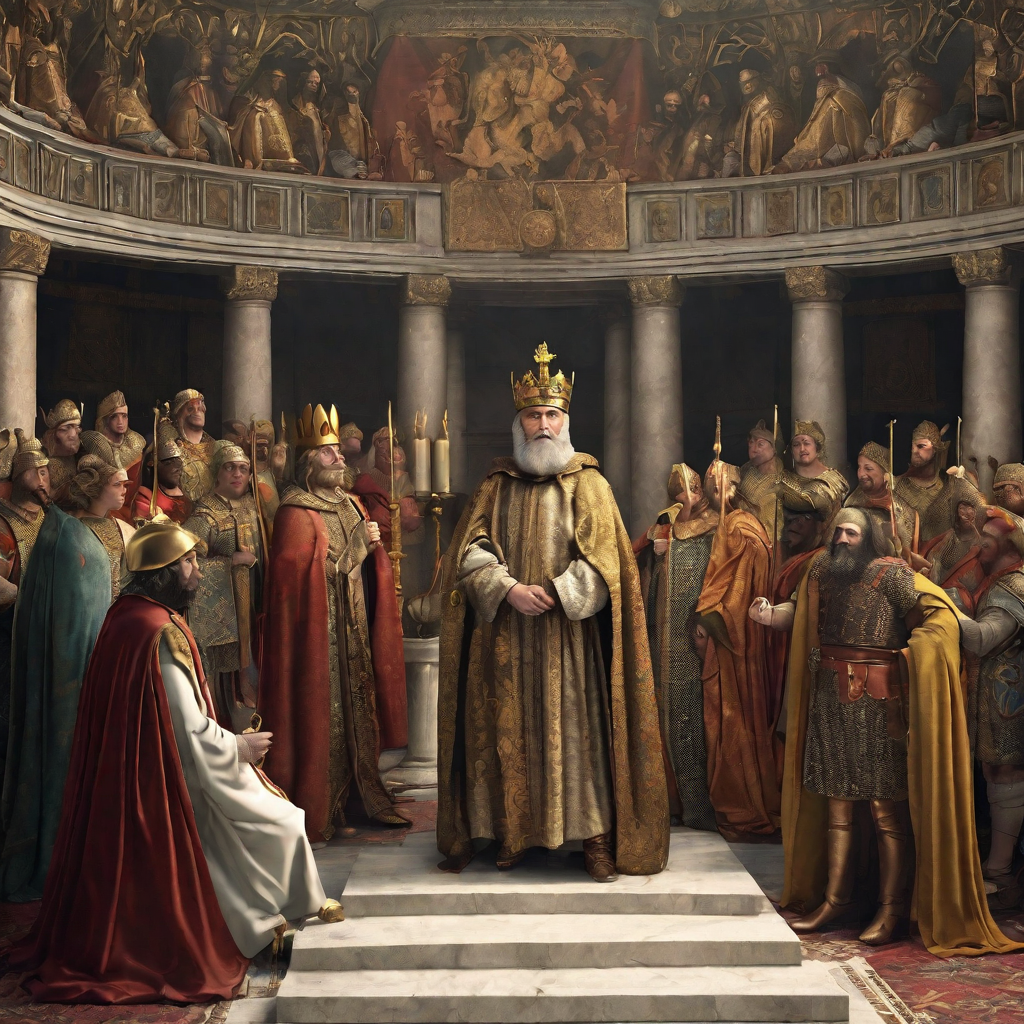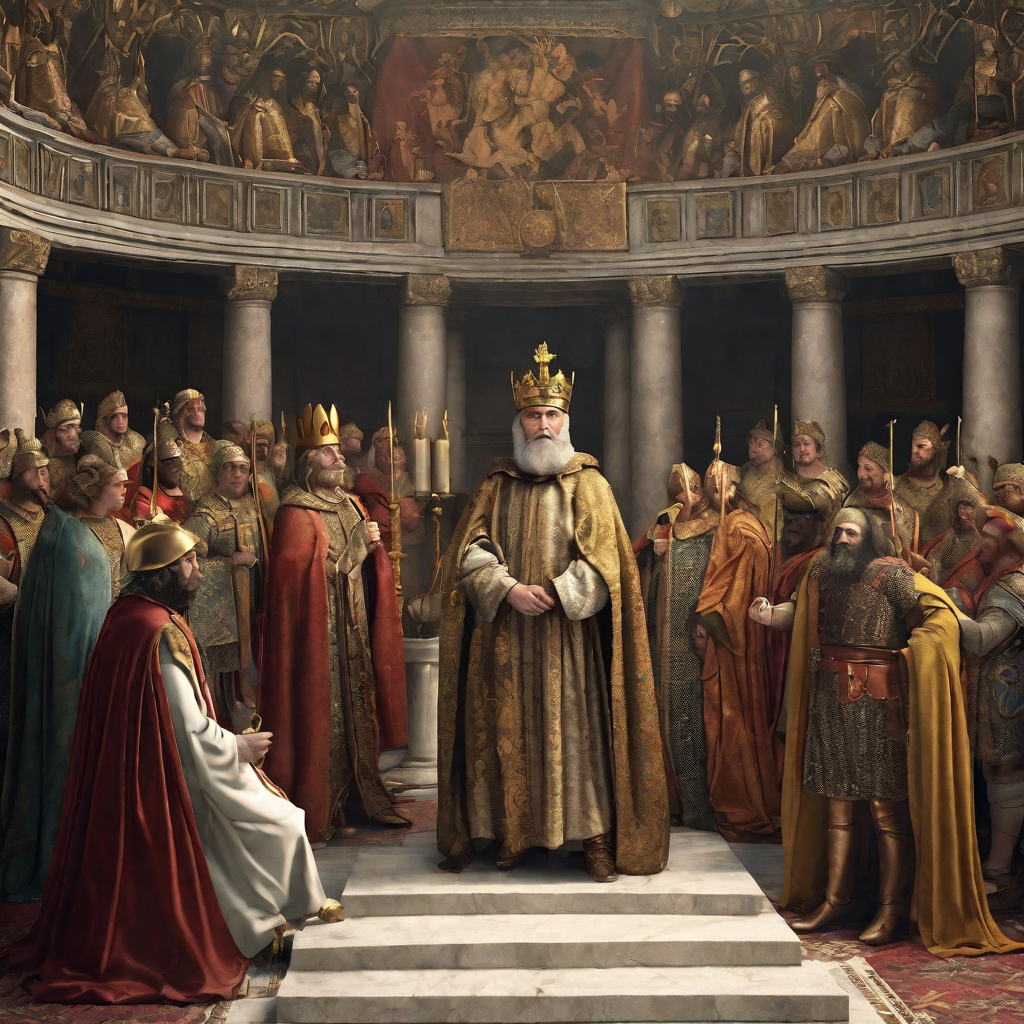Charlemagne, also known as Charles the Great, was one of the most powerful and influential medieval rulers in Europe.
Charlemagne was King of the Franks from 768 to 814 and Emperor of the Romans from 800 to 814. He presided over a vast empire that encompassed modern-day France, Germany, northern Italy and parts of Austria and Spain.
His conquests and governance had a major impact on the development of Western Europe. He was also known for his support of education and promotion of art and culture during the Carolingian Renaissance. Charlemagne was also regarded as the founding father of the Holy Roman Empire.
He was an emperor reigning over tribes and populations that spoke a variety of different languages and dialects. The language Charlemagne himself spoke on a regular basis reveals key information about his background and priorities in communication.
But, was Charlemagne more comfortable communicating to his people in Latin or in his native Frankish Germanic tongue? This article explores the evidence to understand what language Charlemagne spoke.
1. Charlemagne’s Multilingual Language Skills

Contemporary accounts suggest Charlemagne had command of several languages.
According to the Frankish scholar Einhard, who wrote a biography on the ruler after his death, Charlemagne spoke Latin. He also explained that Charlemagne could understood Greek better than he could speak it.
However, Einhard notes,
“He could articulate his ideas with sufficient clarity and in as good Latin as possible.”
Einhard
As a ruler and military leader interacting with people of various backgrounds, Charlemagne found foreign languages useful. He also took care to have his children learn these languages at court.
In addition to Latin and some Greek, Charlemagne spoke the Old Frankish dialect. Old Frankish was the earlier version of languages similar to modern Dutch and German.
Charlemagne seems to have been conversant in Latin for diplomatic relations when necessary. However, his native Old Frankish mother tongue was what he spoke with his royal Frankish contemporaries day-to-day.
Under his guidance, scholars began writing down vernacular German poetry and legends that had previously only been oral traditions. This linguistic preservation hints at the literary respect Charlemagne had for the stories and myths maintained through Old High German dialects.
2. The Language Charlemagne Spoke

As evidenced by Einhard and other scholars who observed him, Charlemagne’s everyday spoken language would have been the Frankish dialect of Old Frankish.
Old Frankish was a West Germanic tongue originating from tribes in areas covering modern-day Netherlands, Germany and France between the 5th and 9th centuries.
As leader of the Frankish people, Charlemagne would have used Old Frankish to communicate with the aristocracy and military forces from whom his power was derived. This Germanic dialect displaced Latin as the primary court language during his reign.
Charlemagne likely spoke the Old Frankish dialect of his namesake Frankish people on a daily basis throughout his reign.
Latin would have only on special occasions, such as receiving an emissary from Rome or delivering an imperial pronouncement.
However, Old Frankish remained his natural means of direct verbal expression and leadership of Frankish nobles.
3. Charlemagne’s Use of Latin

While Charlemagne emphasized Latin literacy and understood its importance as the language of the Church and state affairs, he did not actually speak Latin frequently outside of formal diplomatic meetings or ceremonies.
As Einhard notes, he had competency in articulating himself in Latin.
Charlemagne would have used Latin to issue official decrees to assert his imperial authority in written form. However, Latin was not the casual tongue that came most naturally in conversation for him or many of those closest in his retinue and court.
Charlemagne also decreed that scribes and clergy must spell and pronounce Latin in a consistent way across his realm.
This standardization of Medieval Latin was intentional on Charlemagne’s part for both practical administrative needs and his support of intellectual life.
Latin literacy facilitated communication between the central bureaucracy and regional clergy or nobles supporting governance across his vast empire.
Works on religion, philosophy, history and natural sciences were transmitted through Latin across Europe’s network of monasteries and cathedral schools sponsored by his court. The Carolingian minuscule writing style promoted by Charlemagne also increased the spread of Latin texts.
In systemizing Latin, Charlemagne ensured it could continue serving as the language of Christian thought and sophistry beyond his own reign.
4. A Linguistically Diverse Empire
Charlemagne reigned over a linguistically diverse empire that contained a variety of languages across different regions and social classes.
Latin remained the official language of government, administration, and the Catholic Church.
However, the common population across the realm spoke colloquial dialects derived from Old High German.
Both Frankish peasants and nobles from Charlemagne’s native region used Old Frankish, the specific West Germanic dialect he spoke.
But in peripheral parts of the empire, related Old High German dialects prevailed – Lombardic in Italy, Alemannic in Germany and Bavarian in areas close to the Alps. These reflected the Germanic tribal origins of different groups under Charlemagne’s control.
In areas where Vulgar Latin had taken root from ancient Roman settlements, nascent versions of Old French, Old Occitan and Catalan were emerging.
Differences in vocabulary and pronunciation were beginning to distinguish these Romance languages from each other and from Latin itself.
While Charlemagne promoted Latin literacy through religious institutions, on a vernacular level early Romance tongues co-existed alongside Germanic ones among peasants in his empire.
5. The Importance of Language during Charlemagne’s Reign

In reviewing the historical record and accounts from those within Charlemagne’s court, it is apparent that his primary spoken language was Old Frankish, a West Germanic dialect.
However, Charlemagne also demonstrated some fluency in Latin and had a desire to systemize it within religion and government across his realm.
Determining Charlemagne’s own language preferences provides a window into the wider linguistic landscape of medieval Europe at the turn of the 9th century. Latin still dominated writing and any record-keeping. But most ordinary people continued to speak colloquial forms of Germanic languages like Frankish or other early dialects that preceded modern tongues like French and Italian.
Appreciating this complex language environment and Charlemagne’s place within it gives modern readers crucial perspective on Medieval culture, class and governance.
In Charlemagne’s case, his Germanic speech reminds us his imperial reach was based on alliances with fellow Frankish warlords. Though a champion of Christian Latin scholarship, he relied on his ancestral Frankish to wield power.







